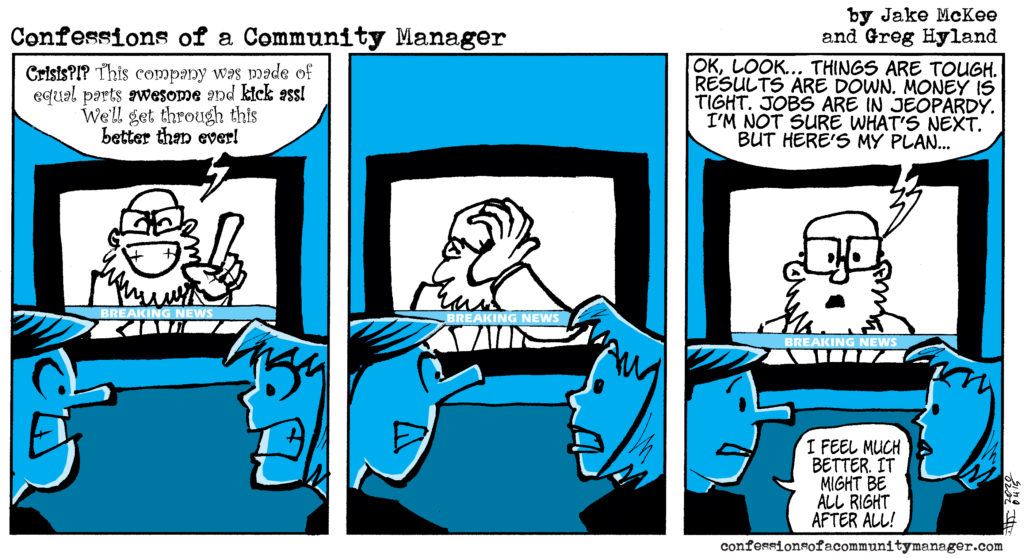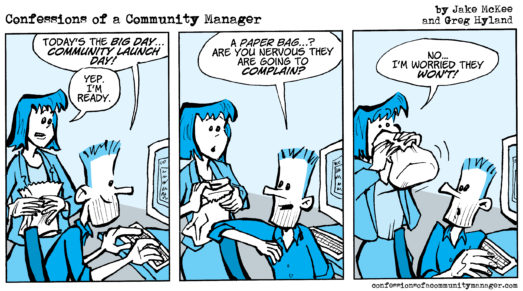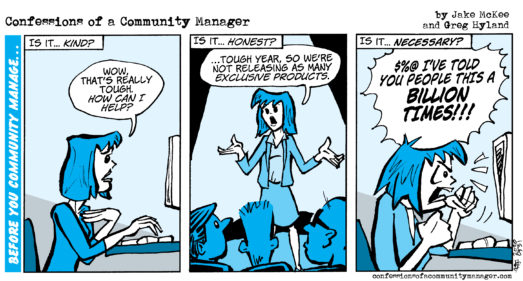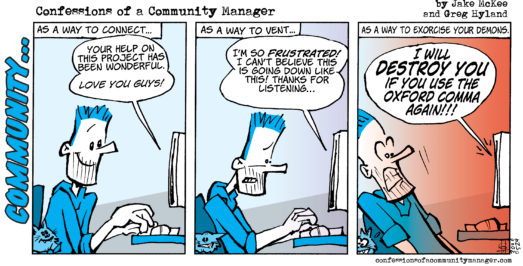Honest Leadership
Leadership is tough. Parenting is tough. Friendship is tough. Hell, any human connection where we have to honestly tell another person something difficult tis tough.
Why?
Because it requires you to overcome your basic human instincts. We humans are naturally programmed to respond to our fears with either anger or humor. Laugh away the pain or scream it away. In polite society, we know that angry responses to our fears won’t go over well, so we tend to just respond with glossy, shiny, happiness. Just laugh it off, explain it away, smile and talk about something else… never let them see you sweat.
A great example of this is President Trump saying that he downplayed the realities of the COVID-19 because he wanted to be a “cheerleader” for the country. He wanted to “give people hope”. Seems natural enough, and on the surface, it’s almost understandable why he wouldn’t want to cause constrination in the country. He didn’t want to cause the country to react with negativity; not to choices, not to the economy, not to any of it.
In truth, however, cheerleading rarely yields hope. People smell the bullshit in cheerleading a mile away. Maybe this worked a few generations ago (probably not), but my 13 year old daughter has a finely tuned bullshit meter that can sense marketing, political, or any other kind of bullshit in ways that I’m shocked by (other than Instagram Influencer sales pitches, but that’s a different blog post).
Cheerleading has its place, I suppose. But cheerleading is meant to pump the crowd up, it’s not the reason the crowd shows up. The crowd is there to watch the teams play. Imagine paying tons of money to watch two teams face off, only to discover that your seats don’t actually face the field, and instead you can only see the cheerleaders talking about how great the team is without sharing any real insights about who’s winning or losing…
One of my favorite Jack Welch quotes is:
“A leader’s job is to look into the future and see the organization not as it is, but as it should be.”
Over the years, I’ve been asked hundreds of times where the community team should be located in the org chart. Marketing always seems to be the go to location. While my answer has always been “the place that will fund, support, and protect the long term vision of community”, I’ve never really been comfortable with marketing as the long-term home for community.
Why?
Because marketing is about cheerleading. That’s not inherently a bad thing. You need cheerleaders. But it’s a temporary boost, a series of short term gains. Community is a long game, played out over time, building slowly, foundationally. Community work is about setting a vision of how a company should fundamentally be living its values, how it should exist as we look at that company well into the future. Community is leadership.
And that means that Community Managers are leaders. Community Managers need to be taking a more active role, a more aggressive role at envisioning the way the company can look into the future and then understanding the business methods that allow that vision to come to life. My friends Brian Oblinger and Erica Kuhl talked about how Community Professionals need to ensure their business chops on a recent episode of their awesome podcast In Before The Lock.
I was struck by my friend Patrick’s recent tweet, and the power of community and leadership. The influence of leaders and leadership absolutely impacts our daily lives.
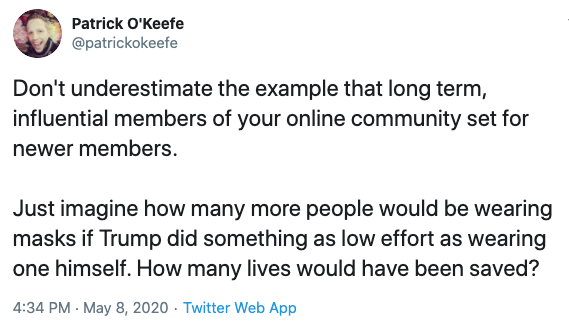
If you visit a new baby in the hospital, you use hand sanitizer on your hands before you hold the new baby. There’s no law requiring you to do this. You don’t complain about “losing rights” when social pressure “forces” you to do this. You do it because you’re a good person looking out for those around you. It’s the right thing to do to hold together the social fabric.
But America is going a more than a little crazy right now with anti-mask people coughing and spitting on store clerks who are trying to enforce mask wearing policies. We’ve made a political issue out of something that is so incredibly basic in other countries.
Our world is in the midst of a global pandemic with a virus that’s incredible confusing. We don’t know how it really works, why it really does what it does, and who it really affects. We don’t have a vaccine, we don’t know when we might get some relief from the pressures of the fear of getting sick, we don’t know when it will be safe to return to normal life, or even what “normal life” might be.

We know these things. We don’t need a cheerleader to convince us those things don’t exist. We need honesty. We need leadership that shoots straight.
America may be losing its collectives minds in a lot of different ways, but it’s also sending a clear smoke signal that it’s in desperate need of clear leadership. It’s why everyone suddenly loves Gov. Cuomo. It’s why Gov. Dewine or Gov. Blevin get high marks from so many, even those that adamantly disagree with their politics. (Side note: If you want to master class in crisis communication, go watch a few hours of these guys giving their daily press briefings. They’re all on YouTube, and they’re impressive)
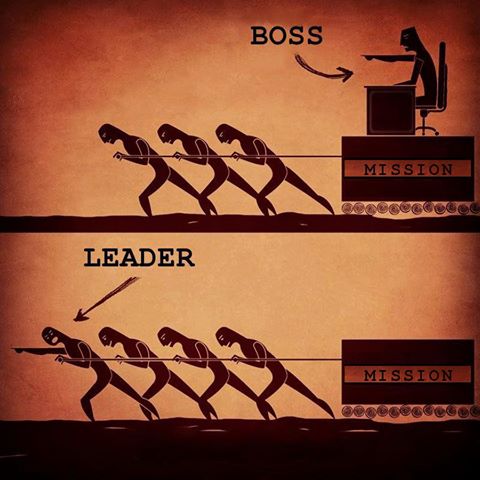
So how do we apply these leadership principles in our communities? Ah! I’m glad you asked (all the way down the page… )
As leaders, here’s a few key ways Community Managers can lead our communities to greatness:
Model behaviors
Your community looks to you to know how to act. You set the example and the tone. Whether a country a company or a community, the people at the top show the people below them what “right” looks like. If you respond to posts with negative snark, so will everyone else. If you respond with post that have great grammar and proper punctuation, it’s far more likely the rest of the community will too. You set the tone.
Call out behaviors you want to see more of
To that end, highlight the behaviors you want to see more of and pay less attention to behaviors you don’t like. Go out of your way to praise great contributions. Don’t let this be like your pyromaniac little brother who was getting all of mom and dad’s attention while you got straight As and nobody paid attention because you “didn’t need help”.
Spend time in the community (online and offline)
Set aside time and dedicated the budget to mix and mingle in your community. If you’re not at the events, if you’re not spending time in the community, you’re not “one of them”…and how can you lead if you’re not in the trenches getting to know them?
Get to know your product
Get to know the product you’re community managing for. If you’re a LEGO Community Manager, part of your job is to build the official product and also to create your own custom models. If you’re a Community Manager for a gaming company, you better have time set aside to get to know your company’s game AND other games really well. You don’t have to be a guru, just make sure you have a passing knowledge so you can hold your own with your community.
You are more influential than you think
You rule. Seriously, you’re a rock star. You might not believe this, but your community certainly does. (And they’re probably right) You have the job most of them probably want! They are ready and willing to listen to you…even if you think they just want to argue with you. Trust me, it can be both things at once.
This needs to be a team effort
Every great general needs their lieutenants to execute their orders with the troops. This is a perception issue as much as a logistical one. As much as a Community Manager can and should be effective by getting down into the trenches, the more this is a team effort with multiple Community Managers engaging the community, the bigger the perception of serious investment comes across. And who doesn’t want to invest themselves in something that others are already invested in?
BONUS: Super Fans represent what you value
When building Super Fan programs, don’t forget to include “leadership” and “representation of community values” as part of the selection criteria. You don’t pick Super Fans based on their participation stats alone. You also choose them based on how they represent what’s important to your community values, mission, and philosophy. The rest of the community will see them as a representation of what’s important to your business.
DOUBLE BONUS: AirBnB CEO letter
Laying off anyone is terribly difficult. But there are better or worse ways to do it. Here’s a better way to do it. This is honest leadership in action.
